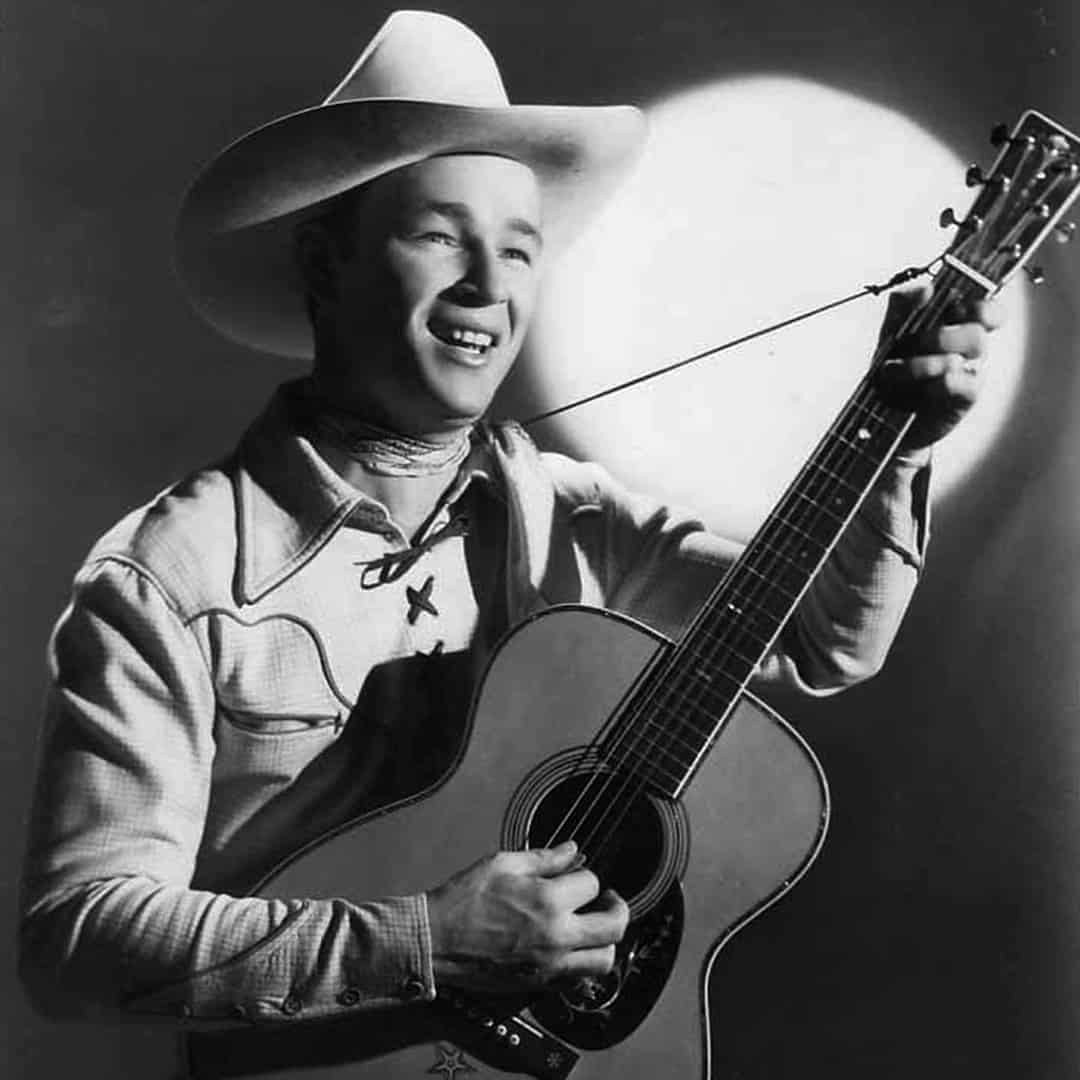Sons of the Pioneers

-
Inducted1980
-
Band Members:
- Leonard Franklin Slye
- Robert Clarence Nobles
- Lloyd Wilson Perryman
- Vernon Tim Spencer
- Thomas Hubert “Hugh” Farr
- Karl Marx Farr
Karl Marx Farr
Born April 25, 1909
Died September 20, 1961
Birthplace Rochelle, Texas
Thomas Hubert “Hugh” Farr
Born December 6, 1903
Died March 17,1980
Birthplace Llano, Texas
Robert Clarence Nobles
“Bob Nolan”
Born April 1, 1908
Died June 16, 1980
Birthplace New Brunswick, Canada
Lloyd Wilson Perryman
Born January 29, 1917
Died May 31, 1977
Birthplace Ruth, Arkansas
Leonard Franklin Slye
“Roy Rogers”
Born November 5, 1911
Died July 6, 1998
Birthplace Cincinnati, Ohio
Vernon Tim Spencer
Born July 13, 1908
Died April 26, 1974
Birthplace Webb City, Missouri
“Original” Sons of the Pioneers
America’s premier western singing group was formed in 1933 by Ohio-born Leonard Franklin Slye—later known as Roy Rogers—and was initially called the Pioneer Trio. The group also included Canadian-born Bob Nolan and Tim Spencer of Oklahoma.
In late 1933 or early 1934, the trio added Hugh Farr, one of the finest country fiddlers of that era, and in mid-1935, guitarist Karl Farr, Hugh’s brother, joined the quartet, bringing with him a high level of musicianship and playing that would influence other guitarists for years to come. Slye, Spencer, Nolan, and Hugh and Karl Farr are referred to by some as the “original” Sons of the Pioneers.
With a new name, Sons of the Pioneers, the group began a series of transcriptions for Standard Radio in late 1934, ushering in an exciting new genre of American roots music that featured unique western themes, three-part close-harmony singing, and an impressive instrumental backup. Their intricate harmony singing was widely admired and was soon emulated by almost every western singing group in America. In addition, they may have been the first western group to feature trio yodeling.
The songs composed by Nolan and Spencer—such as “Tumbling Tumbleweeds,” “Cool Water,” “Blue Prairie,” “Way Out There,” “The Everlasting Hills of Oklahoma,” “Happy Rovin’ Cowboy,” “Room Full of Roses,” and “A Cowboy Has to Sing”—were decidedly different from previous western music, both lyrically and melodically. Many of their compositions were inspired by the Pioneers’ participation in a considerable number of B-western movies, initially in 1935 with Charles Starrett, then in 1941 with their former bandmate Slye, who by then, had adopted the screen name Roy Rogers and was rivaling Gene Autry for the title of America’s favorite singing cowboy star.
In 1934, following Bing Crosby and cowboy singer-composer Stuart Hamblen, the Pioneers became the third act to be signed by the fledging American branch of Decca Records. The Pioneers’ Decca recordings proved to be highly popular with fans.
Songs
00:00 / 00:00
00:00 / 00:00
00:00 / 00:00
With a new name, Sons of the Pioneers ushered in an exciting new genre of American roots music that featured unique western themes, three-part close-harmony singing, and an impressive instrumental backup.
Videos
“Cool Water”
“Trailer”
Photos
-
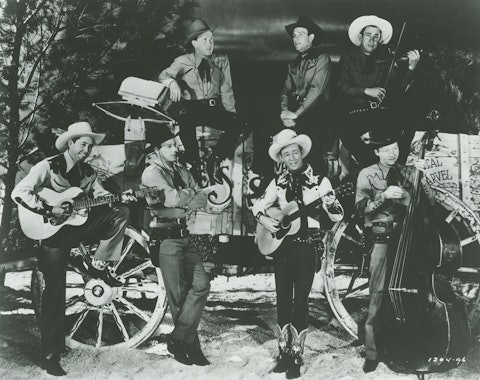
Movie still of Roy Rogers (right of center, playing acoustic guitar) and Sons of the Pioneers, c. 1940s.
-
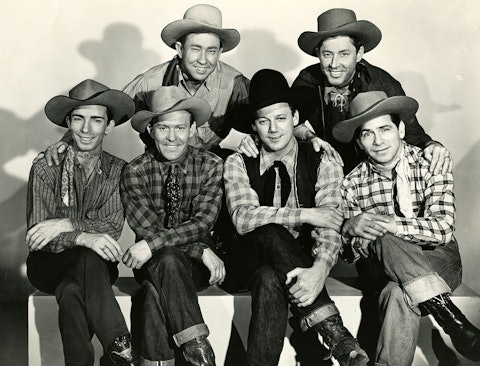
Publicity photo of Sons of the Pioneers, c. 1940s.
-
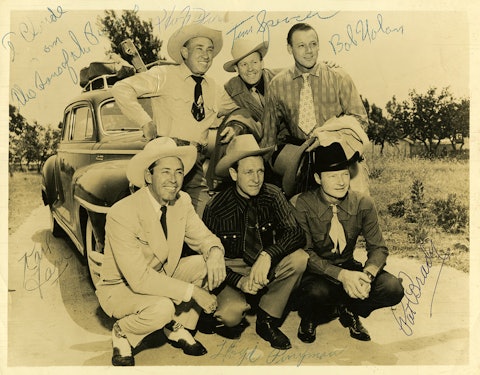
Autographed publicity photo of Sons of the Pioneers, 1948.
-
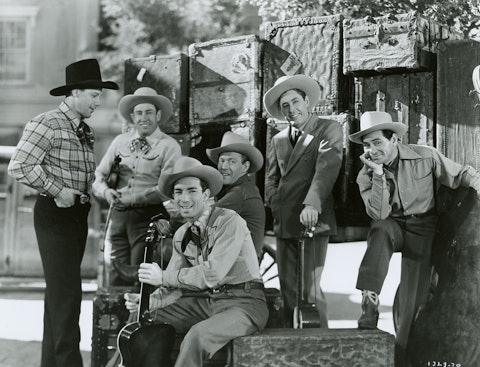
Sons of the Pioneers with musical instruments and luggage, c. 1940s.
-
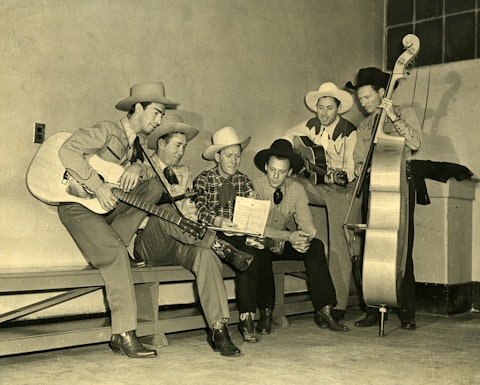
Sons of the Pioneers with musical instruments, possibly backstage at the Grand Ole Opry, 1947. Photo possibly by WSM staff photographer Les Leverett.
The Ensemble and Its Legacy Endures
In late 1936, tenor Lloyd Perryman joined the group. Comedian and bass player Pat Brady replaced Slye, who had left to join Republic Pictures in 1937.
After signing with RCA Victor in 1945, while Ken Carson, Perryman’s wartime replacement, was still a member, the Pioneers proved to be one of Victor’s most popular attractions. They remained with the label until 1969.
Meanwhile, in 1949, both Spencer and Nolan retired and were replaced by Ken Curtis and Tommy Doss. Hugh Farr left in 1958, and Karl Farr died of a heart attack in 1961 while onstage in Springfield, Massachusetts. Upon the departure of Curtis in 1952, Dale Warren joined.
Following the death of Perryman in 1977, Warren took over the leadership of Sons of the Pioneers, guiding them into until his death in 2008. The group continued to perform in concert and record with a lineup that featured, among many others, Doye O’Dell (guitar, vocals), Billy Armstrong (fiddle), Billy Liebert (accordion), Gary LeMaster (lead guitar), and Rome Johnson (vocals).
More recently, Tommy Nallie (vocals, bass), who joined the group in 1983, became the band’s “trail boss.” Other recent members have included Ken Lattimore (vocals, fiddle), Roy “Dusty” Rogers, Jr. (vocals, MC), John Fullerton (vocals, guitar), and Paul Elliott (fiddle).
Through various personnel changes, the group continues to perform, as of 2022, and is now based in Branson, Missouri. Sons of the Pioneers remain one of the longest continuously performing groups in country music history.
—Ken Griffis
Adapted from the Country Music Hall of Fame® and Museum’s Encyclopedia of Country Music, published by Oxford University Press

